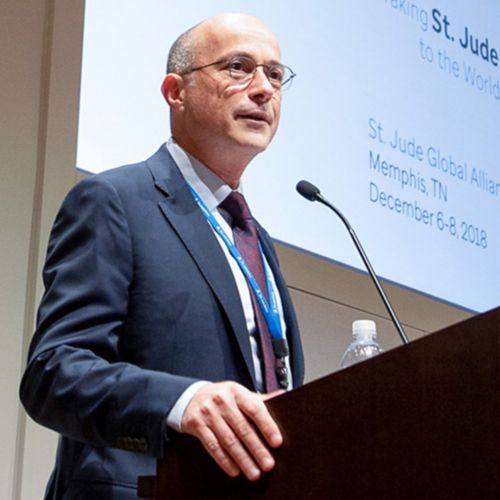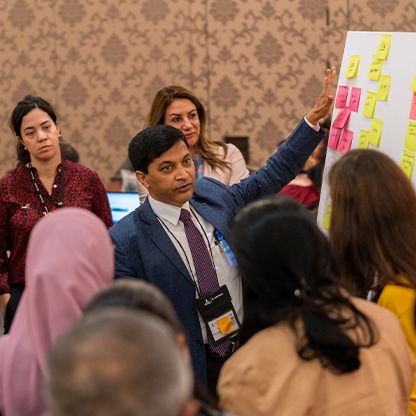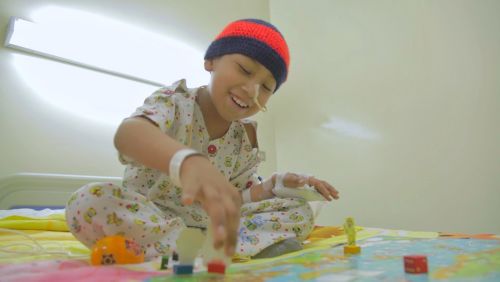St. Jude Family of Websites
Explore our cutting edge research, world-class patient care, career opportunities and more.
St. Jude Children's Research Hospital Home

- Fundraising
St. Jude Family of Websites
Explore our cutting edge research, world-class patient care, career opportunities and more.
St. Jude Children's Research Hospital Home

- Fundraising
Palliative Care
Other Transversal Programs:
The St. Jude Global Palliative Care Program attends to the suffering of children diagnosed with catastrophic illness and their families, regardless of diagnosis, prognosis or location. Our program does this through high-quality, evidence-based medicine and the art of healing through compassionate and empathetic care.
Our program focuses on quality of life by promoting the dignity and comfort of patients and their families, addressing their physical, psychological, social and spiritual suffering.
Program Initiatives
The Global Palliative Care Program is working to define the current state of palliative care in underserved communities worldwide and to drive interventions to relieve the suffering of patients and their families. This is done, in collaboration with our global partners, through culturally sensitive projects based on the four pillars of the program: research, education, capacity building and advocacy.
Examples of this work include:
Research
We support research initiatives that aim to describe the current state of palliative care for children globally and the implementation of high-quality, evidence-based interventions in pediatric palliative care.
- ADAPT: The Assessing Doctors’ Attitudes on Palliative Treatment (ADAPT) study identifies physician access, barriers, knowledge and perceptions on palliative care integration for children diagnosed with cancer, as outlined by the World Health Organization (WHO) guide in 2018.
- In 2019, we conducted the ADAPT study across 11 countries in the Euro region (formerly the Eurasia region), obtaining a median country response rate of 60% (range: 15%–94%). We published our ADAPT Eurasia study findings in two publications in Cancer Journal.
- Based on the success of the ADAPT-Euro study, our group plans to conduct this study across all global regions. It has completed the ADAPT study in Latin America, conducting the study across 18 countries, with an overall response rate of 51.4% (23.7%-100%). We have published our ADAPT Latin America study findings in JAMA Network Open.
- Currently, the ADAPT study is being conducted in the Asia Pacific, Western Europe and Eastern Mediterranean regions, with plans to conduct the study in China and Sub-Saharan Africa.
- The expansion of the ADAPT study will make it possible to describe the global perspective of health care professionals regarding palliative care in childhood cancer and to create strategies adapted to each region's needs.
- CATALYST Study: The Clinician Approach to Choosing Therapy in LMICs for Young Patients With Cancer at the Start of Treatment Study aims to investigate the variables influencing physicians’ upfront treatment decision-making in LMICs (low- and middle-income countries).
An estimated 90% of pediatric cancer diagnoses occur in low- and middle-income countries (LMICs), with many children presenting with advanced or incurable cancer at the time of diagnosis. Why, when or how physicians in LMICs make decisions about offering curative versus noncurative treatments to these children is poorly understood. The CATALYST study uses qualitative methodology to understand this decision-making process better.
Education
The St. Jude Global Palliative Care Program has built internal and external training opportunities to support multidisciplinary clinicians in providing palliative care for children diagnosed with catastrophic illnesses.
- Opportunities at St. Jude Children’s Research Hospital: Our program offers observational rotations, palliative care research internships and a global fellowship in palliative care on campus. Each year, the program holds the Global Academy in Palliative Care in Memphis, which includes Education in Palliative and End-of-Life Care (EPEC) Pediatrics training, among other training opportunities. In 2022, the Global Academy had local and international facilitators and included 42 multidisciplinary health professionals from 29 countries.
- External Opportunities for Education and Training: Externally, the Global Palliative Care Program offers multiple educational workshops on general and specific palliative care topics such as pain and symptom management, end-of-life care and grief and bereavement support. Additionally, we have supported scholarships to enable individuals from LMICs to participate in EPEC Pediatrics training. This training is now held in different parts of the world, in multiple languages and adapted to regional needs. These course offerings include online and in-person training in the principles of palliative care for pediatric patients. Between 2021 and 2022, EPEC Pediatrics courses were held in Latin America, Europe and Africa. In that time, our program awarded 230 scholarships to health professionals from 56 countries for various virtual and in-person training events.
Capacity Building
Through patient-centered initiatives, we develop projects that strengthen palliative care skills for practical application and improvement in direct patient care.
- Adapted Resource and Implementation Application (ARIA) Guide: In a collaboration between St. Jude Global and the International Society of Paediatric Oncology (SIOP), the ARIA project involves developing a shared online platform for hosting detailed Adapted Management Guidelines for the diagnosis, treatment and supportive care of children diagnosed with cancer. ARIA integrates the revised SIOP Pediatric Oncology in Developing Countries (PODC) adapted treatment regimens to produce practical treatment guidance. Our team and international multidisciplinary collaborators are leading the palliative care component of the ARIA guidelines.
- Global Comfort Promise Package: The Global Comfort Promise is a St. Jude Global Procedural Pain Package that aims to reduce procedural pain in children diagnosed with cancer. We are piloting this quality improvement project in four countries — Brazil, Peru, the Philippines and South Africa — with excellent results. By 2023 the project is expected to enter the expansion phase, with 15 to 20 more sites worldwide.
Explore where institutions are implementing the Global Comfort Promise Package.
View Our Map
- PrOTECT (Pediatric Oncology Tool for End-of-Life Care Treatment): PrOTECT will define a set of measures to assess the quality of end-of-life care for children diagnosed with cancer in LMICs. The tool is currently under development, utilizing modified Delphi and discrete choice experimental methodology, with an expected completion date of spring 2023 and plans to pilot the tool in summer 2023.
Advocacy
We advocate for positive change through our research and collaborations with WHO, the Pan American Health Organization (PAHO), the International Children’s Palliative Care Network (ICPCN), the Worldwide Hospice Palliative Care Alliance (WHPCA) and many others.
The synergy created between our four pillars will result in a comprehensive response to relieve the suffering of underserved communities worldwide.
Our Team
-
View Details
Mike McNeil, MD, MPH
Assistant Member, St. Jude Faculty
Director, St. Jude Global Palliative Care Program
Mike McNeil, MD, MPH
Assistant Member, St. Jude Faculty
Director, St. Jude Global Palliative Care Program
Affiliations
Research Interests
- Defining the state of palliative care for children with cancer in resource-constrained settings
- Utilizing improvement science to implement interventions to address patient and family suffering through culturally sensitive and collaborative projects on a global scale
- Bereavement support
Contact Information
Mike McNeil, MD, MPH
Global Pediatric Medicine
MS 721, Room O4007
St. Jude Children's Research Hospital
262 Danny Thomas Place
Memphis, 38105
-
View Details
Marta A. Salek, MD, MPH
Assistant Member, St. Jude Faculty
Affiliations
Research Interests
- Early integration of palliative care in pediatric oncology
- Decision making for children diagnosed with advanced cancer
- Optimizing care and quality of life for children diagnosed with cancer on a global scale
Contact Information
Marta A. Salek, MD, MPH
Global Pediatric Medicine
MS 721
St. Jude Children's Research Hospital
262 Danny Thomas Place
Memphis, TN 38105-3678
-
View Details
Rima Saad Rassam, PhD
Program Coordinator, Palliative Care Program
Affiliations
Short Biography
Rima Saad Rassam, PhD is a program coordinator in the department of Global Pediatric Medicine, Global Palliative Care Program. She carries more than 22 years of combined expertise in pediatric oncology nursing and pediatric palliative care.
During her professional journey, Rima has developed strong practice, education and research skills through her various nursing roles at the Children's Cancer Institute in Lebanon and at St Jude Global Nursing where she was a program coordinator for the last two years.
She has completed the Nursing fellowship program at St. Jude Children's Research Hospital in 2007 and two research residencies at University of Michigan and Harvard University in 2019.
Her passion for pediatric palliative care molded her academic progress within the Master and PhD degrees at the American University of Beirut, Lebanon. Her research studies focus on parental perspectives toward pediatric palliative care to ultimately uncover potential areas for improving palliative care in limited resource settings. Rima disseminated her research through several publications in peer-reviewed journals and presentations at national, regional, and international conferences. She received many national and international awards.
Rima is excited to continue her professional journey at St Jude Global that will provide a venue for investing her passion and skills to alleviate suffering and improve care for children with catastrophic diseases around the world.
-
View Details
Ximena García-Quintero, MD, MSc
Program Manager, Palliative Care Program
Affiliations
Short Biography
Ximena García-Quintero, MD, is a Program Manager for the Global Palliative Care Program within the Global Pediatric Medicine Department at St. Jude Children’s Research Hospital.
Originally from Cali, Colombia, Ximena trained as a pediatrician and holds a master’s degree in Pediatric Palliative Care. She further specialized through the Harvard Medical School Palliative Care in Education and Practice (PCEP) program.
She is the founder of one of Colombia’s first pediatric palliative care programs, which continues to sustain and expand. Her program was awarded a My Child Matters grant (2019-2021), significantly increasing its national reach and impact. During her time in Colombia, she began collaborating with St. Jude Global as a country leader for the ADAPT Study in Latin America, further deepening her interest in global health.
Since joining the GPM team, Ximena has supported various global palliative care initiatives in education, research, and quality improvement, including the Global Comfort Promise. She is particularly passionate about leadership and program implementation in LMICs, quality improvement, and research, striving to reduce unnecessary suffering in children with cancer and other catastrophic diseases by ensuring they receive high-quality, compassionate care.
Contact Information
Ximena García-Quintero, MD, MSc
St. Jude Children's Research Hospital
262 Danny Thomas Place
Memphis, TN 38105-3678
-
View Details
Doralina Anghelescu
Consultant, Global Palliative Care Program
Doralina Anghelescu
Consultant, Global Palliative Care Program












